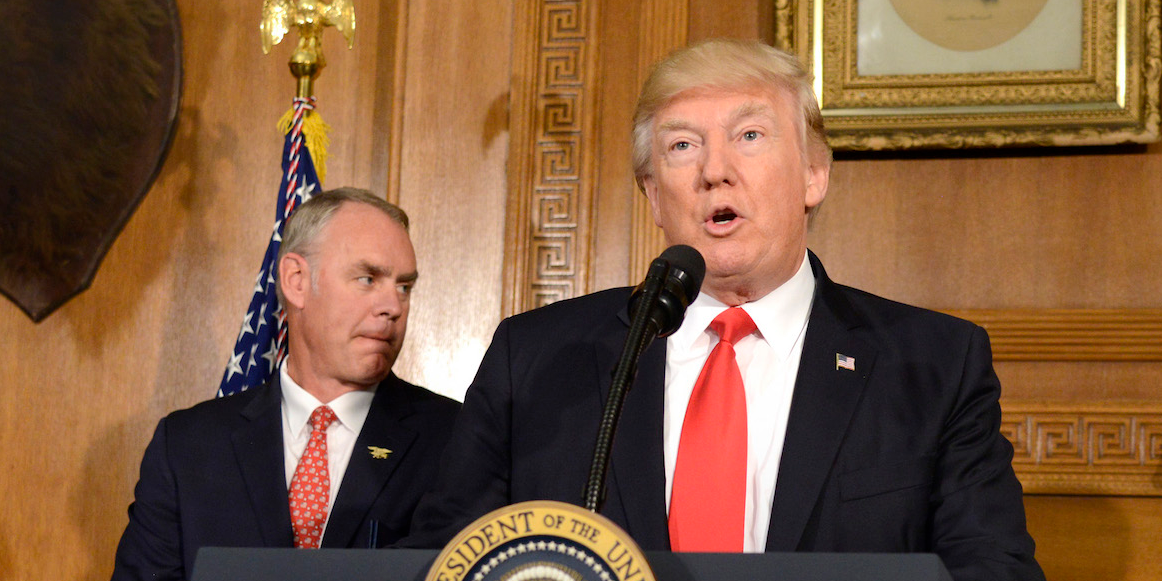- Ryan Zinke, Trump’s interior secretary, announced Tuesday that Florida would be exempt from a new plan to expand offshore drilling in US waters after he spoke to Republican Gov. Rick Scott.
- The new plan, and Florida’s exemption, was blasted by lawmakers of both parties in coastal states.
On Tuesday, Interior Secretary Ryan Zinke announced that the state of Florida would be exempt from the Trump administration’s new plan to open up offshore drilling, and the reversal has already drawn blowback.
Zinke said that the decision to exempt Florida from the expansion of offshore drilling came after discussions with Republican Gov. Rick Scott.
“I support the governor’s position that Florida is unique and that its coasts are are heavily reliant on tourism as an economic driver,” Zinke said in a statement announcing the decision.
The change in course comes less than a week after the new plan to open 98% of US offshore waters to drilling was rolled out. Environmental groups and lawmakers from a slew of states have expressed concerns about the environmental and economic impact of the move.
Democratic lawmakers in states along the coast, most of whom came out against the plan, were predictably incensed by the exemption for Florida.
"New York doesn't want drilling off our coast either," tweet New York Gov. Andrew Cuomo. "Where do we sign up for a waiver @SecretaryZinke?"
Democratic North Carolina Gov. Roy Cooper also blasted the turnaround, retweeting a video from the Interior Department in which Zinke announced the move with Scott, adding: "Is this thing on? I'll try again: Not Off Our Coast - RC."
Coastal Republicans are not happy
In addition to Democrats, many Republicans have also decried the change by the Trump administration and the Florida exemption.
Gov. Henry McMaster of South Carolina, who endorsed Trump in his run for president back in January 2016, said that he did not support the offshore drilling decision.
"I am opposed to offshore drilling off South Carolina's shore, I'm opposed to seismic testing off South Carolina's shore," McMaster told reporters. "Our tourism industry and glorious natural resources are beyond compare in the United States, they are a source of enormous economic growth and prosperity and we cannot take a chance with those resources, those industries, and that economy."
McMaster also said he will be taking "appropriate steps" to address the issue with Trump.
Republican Gov. Larry Hogan of Maryland also came out against the plan and said he would attempt to block the drilling.
"The governor has made it extremely clear that he opposes this kind of exploration off our coastline and that will never change," Amelia Chassé, a spokesperson for Hogan, told Business Insider. "The administration will continue making the case to the federal government that Maryland's bays and beaches are vital to the health and economy of our state and region."
Republican members of Congress were also not pleased with the new drilling plans nor with the limited exemption for Florida. Rep. Walter Jones, who represents coastal North Carolina including the Outer Banks, told Business Insider that states should have ultimate control over their water and any state should be given a wavier if the governor requests it.
"I think it's very unfair," Jones said. "If governors of every state on the coast makes this same type of request, I would hope that the secretary of the interior as well as the administration would see the issue of fairness."
GOP Rep. Mark Sanford, whose district include parts of coastal South Carolina including Charleston, also derided the Florida exemption in an interview with CNN.
"If we can exempt Florida, based on as Secretary Zinke put it 'an unusually high degree of tourism reliance,' well then the same certainly ought to exist for South Carolina," Sanford said.
When asked if the exemption for Florida was a political favor for Scott, Sanford said "it certainty looks, smells, and feels that way."
"You have Florida, which obviously has incredibly electoral college consequences in presidential contests, all of a sudden being exempted in a way that other states might not be that are a little smaller in population count," Sanford told CNN.
Republican governors in other coastal states including New Hampshire and Massachusetts have previously come out against the new drilling plan.
At the same time, a number of Republicans are on board with the plan and believe it could help boost the economic prospects of the coastal states.
"So this administration is putting a very broad look back on the table. I think that's the right policy," GOP Sen. Dan Sullivan told Business Insider. "But then we should be hearing and Secretary Zinke has made this clear, from leaders in the states, elected leaders, governors, senators in taking to their concerns. So I think the process is working out how it should be."
